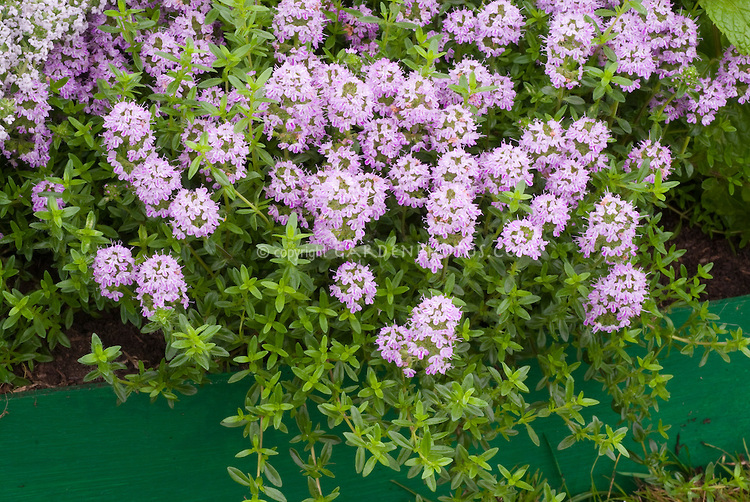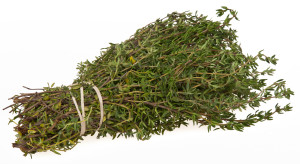Thyme – An aromatic and medicinal herb
Thyme – A small perennial subshrub
Thyme (Thymus vulgaris L., Lamiaceae) is an aromatic and medicinal herb that has been widely used in folk medicine , food preservatives and phytopharmaceutical preparations.The therapeutic potential of thyme rests on contents of flavonoids, thymol, carvacrol, eugenol,aliphatic phenols as well as luteolin, saponins, and tetra methoxylated flavones. Thyme is a small perennial subshrub, a semi evergreen groundcover that rarely grows more than 40 cm tall. It has both horizontal and upright habits. The stems become woody with age.
Various thyme extract pharmacodynamic activities and the essential oil, respectively, demonstrated in vitro, but availability of these compounds in the respective target organs has not been proven yet.
Thyme Leaves

Thyme leaves are very small, usually 2,5 to 5 mm in length and vary considerably in shape and hair covering, depending on the cultivar, with each species
having a slightly different scent. T. vulgaris leaves are oval to oblong in shape and somewhat fleshy. Leaves are almost stalkless with margins curved inwards and highly aromatic. The fragrance of its leaves is the result of an essential oil, which gives it its flavouring value for culinary purposes,and is the source of its medicinal properties.
Thyme Flowers
The flowers terminate the branches in whorls. The calyx is tubular, striated,closed at the mouth with small hairs and divided into two lips, the uppermost cut into three teeth and the lower into two. The corolla consists of a tube about the length of the calyx, spreading at the top into two lips of a pale purple colour, the upper lip erect or turned back and notched at the end, the under lip longer and divided into three segments.
Thyme Seeds
The seeds are round and very small and retain their germinating power for 3 years.
Common culinary types Thyme are
- Lemon thyme – Thymus ×citriodorus
- Golden lemon thyme – Thymus ×citriodorus ‘Aureus
- Caraway thyme – Thymus herba-baron
- French thyme, common thyme -Thymus vulgaris
- Wild thyme – Thymus pulegioides
Thyme medicinal uses – health benefits – culinary uses
- Essential oil of thyme is used to preserve processed meat and butter, and in making chewing gum, ice cream, candy, and the liqueur Benedictine.
- The antiseptic and tonic properties of thyme make it a useful tonic for the immune system in chronic, especially fungal, infections as well as an effective remedy for chest infections such as bronchitis,whooping cough, and pleurisy
- It is used for skin problems such as oily skin, sciatica, acne, dermatitis, eczema and insect bites
- Lemon thyme, is recommended for fish, for tea, and for salad dressings, or anywhere a milder thyme is desired. Thyme is a common ingredient in a French bouquet garni. A favorite herb jelly made from thyme infused from thyme blossoms is actually from nectars of other genera, most likely Satureja and Thymbra.





















